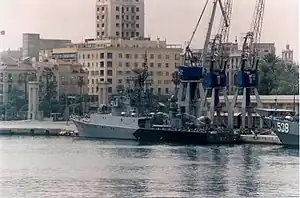 KRI Lambung Mangkurat | |
| History | |
|---|---|
| Name | Angermünde |
| Namesake | Angermünde |
| Builder | Peene-Werft, Wolgast |
| Commissioned | 26 July 1985 |
| Decommissioned | 1994 |
| Identification | Pennant number: 214 |
| Fate | Sold to Indonesian Navy |
| Name | Lambung Mangkurat |
| Namesake | Lambung Mangkurat |
| Commissioned | 12 July 1994 |
| Homeport | Surabaya |
| Identification | Pennant number: 374 |
| Status | Active |
| General characteristics | |
| Type | Kapitan Patimura-class corvette |
| Displacement |
|
| Length | 75.2 m (247 ft) |
| Beam | 9.78 m (32.1 ft) |
| Draft | 2.65 m (8.7 ft) |
| Propulsion |
|
| Speed | 24.5 knots (45.4 km/h) |
| Range | 2,100 nautical miles (4,000 km) at 14 knots (26 km/h) |
| Complement | 62 crew |
| Armament |
|
KRI Lambung Mangkurat (374) is a Kapitan Patimura-class corvette currently operated by the Indonesian Navy. Before her service in Indonesia, the ship was part of the East German Volksmarine, as Angermünde (214).
Specifications
The Parchim-class corvette was developed for the East German Navy in the late 1970s, and built by the Wolgast Peene-Werft. The ships were designed for coastal anti-submarine warfare. In case of an all-out NATO-Warsaw Pact war in Europe their prime targets would have been the small U-206 coastal submarines of the West German navy. The first ship, Wismar (now the Indonesian KRI Sutanto), was launched on 9 April 1981 in Rostock, and subsequently another 15 ships were built until 1986. To make production more economical, the Soviet Union agreed to purchase another 12 ships from Wolgaster Peenewerft built between 1986 and 1990, thereby effectively subsidising the East German shipbuilding industry.
The ships of the Soviet Navy were named Parchim II by NATO. Though useful as a coastal ASW platform, the Soviet production of the similar but far more powerful Grisha class made this purchase even more illogical for the Soviet Navy. After German re-unification the former East German ships were sold to the TNI-AL (Indonesian Navy) in 1993. The Indonesian Navy extensively refurbished their Parchims, to the point where the refurbishing exceeded the cost of purchase. They are still in service, both in the Indonesian Navy and in the Russian Baltic Fleet.
Indonesian Parchims have completed a major refit to fulfill Indonesian Navy needs.[1] The one twin 57 mm gun AK-725 and one twin 30 mm gun AK-230 were retained except for KRI Sultan Thaha Syaifuddin where the 30mm AK-230 replaced by Chinese made Type 730 CIWS. The RBU-6000 also retained as a major armament. Two SA-N-5 SAM removed and replaced by two Vektor G12 20mm gun.[1][2] Four 400mm Russian-made torpedo launcher was out of service because there is no Russian made torpedo in Indonesian Navy inventory so this Russian made torpedo launcher replaced by two western made triple torpedo launcher but only for two ships.
Service history
Angermünde was commissioned on 26 July 1985.[3][4] Following the end of the Cold War and the reunification of Germany, Angermünde was sold to the Indonesian Navy in 1994, alongside 15 other Kapitan Patimura-class corvettes and 23 other vessels in a US$12.7 million deal. She was renamed Lambung Mangkurat and was commissioned on 12 July 1994, following modifications.[4][5]
References
- 1 2 "Parchim (class) / Project 1331M". Militaryfactory.com. Archived from the original on 2018-02-05. Retrieved 2018-02-05.
- ↑ https://www.adturtle.biz/LP_TA/index.cfm?T=438532
- ↑ "Small Anti-Submarine Ships Project 1331M". russianships.info. Retrieved 26 April 2019.
- 1 2 "Corvette Parchim (1331M)". theworldwars.net. Retrieved 20 April 2019.
- ↑ Julio, Emirald (28 June 2016). "Mengulas KRI Imam Bonjol, Pengawal Kedaulatan RI di Natuna". Okezone (in Indonesian). Retrieved 26 April 2019.